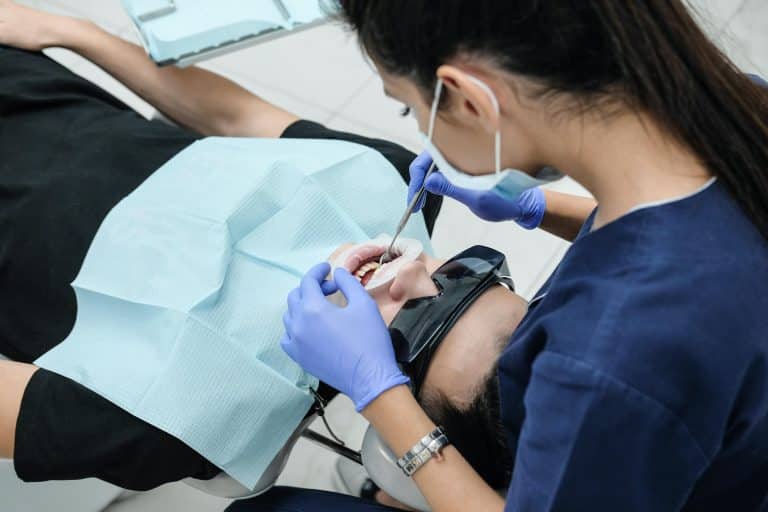While losing teeth as a child is exciting and generally rewarded by the generous Tooth Fairy, losing teeth as an adult has a few consequences.
Unfortunately, tooth loss often occurs in adults as a result of tooth decay, gum disease or trauma, and this loss is not quite as simple as putting the tooth under a pillow and waiting for the Tooth Fairy.
When tooth loss occurs, your local Midland dentist can replace the tooth with a dental implant, dentures or a dental bridge to maintain the structure of the gum and functionality of the teeth. However, many adults opt to just go without that particular tooth.
There are a number of significant health risks associated with not replacing a lost tooth, including speech issues, trouble eating and even altered facial structure!
1. Speech Problems
Your teeth actually play a significant role in the way speech sounds, with your teeth, tongue, lips, cheeks and vocal tract coordinating with one another to create the required sounds and words.
Strident sounds are most impacted by gaps in teeth at the front of your mouth, with words such as “zoo”, “shoe” and “fish” all requiring friction of airflow between teeth. Other sounds impacted are “th” sounds like “the” or “thing”.
With gaps in your teeth, you may find yourself spitting on friends or colleagues as you speak or not articulating words as usual.
2. Tooth Movement
Adults usually have 32 teeth packed tightly into the mouth, including four wisdom teeth.
When one or more of these teeth are extracted, the teeth on either side of the gap may slowly move into the empty space over time. As well as this, opposing teeth can supraerupt into the gap asued. This can results in losing additional teeth.
This presents a number of issues, as teeth each have their own function in the mouth and if they are out of position, you may experience issues chewing and cleaning your teeth effectively.
3. Issues Eating
There are four types of teeth, with each tooth providing an important function to help you chew your food.
- Incisors – The four top and four bottom teeth at the centre of your mouth, which are designed to help you bite into your food.
- Canines – The next teeth along in your mouth, with two on the top and two on the bottom of your mouth. These teeth are the sharpest teeth in your mouth and are used to tear into food.
- Premolars – There are eight premolars in your mouth, which work to crush and tear food up. These teeth have a flat surface.
- Molars – These teeth are your grinding and chewing teeth and you have 12 in total, including four third molars – more commonly known as wisdom teeth.
Missing any of these teeth will impact how you chew and consume food – you may find yourself chewing more on one side of your mouth or not being able to eat your favourite foods at all.
Constantly chewing more on one side of your mouth causes additional wear on other teeth. When you reduce the amount of teeth in the mouth, your bite strength remains the same. From this, your bite force is spread across fewer teeth, leading to the possibility of fractures in the long-term.
4. Links to Chronic Disease
Poor oral health is a significant cause of tooth decay and subsequent tooth loss, so it’s probably not surprising that oral health issues may be related to chronic health issues
Chronic diseases that may be related to poor oral hygiene include cardiovascular disease, diabetes, respiratory diseases, stroke, dementia, stomach ulcers, cancer and obesity.
In addition, chronic health problems may also impact oral health by increasing risk of decay or periodontal disease.
5. Altered Appearance and Facial Structure
Teeth play a crucial role in maintaining facial structure – even the molars you can’t see when you smile!
Without your teeth, your cheeks might appear sunken in and the appearance of your lower half of your face may change. And if you’re missing teeth towards the front of your mouth, it will affect the appearance of your smile too.
Although you might think that missing back molars might be no big deal, they are still crucial to your appearance and important to take care of.
Your Trusted Midland Dentist
The best way to avoid missing teeth is to take care of the pearly whites you’ve got, and the best way to do that is with regular dental check-ups at Midland Dental Hub. (Also Read: How Often Do I Need to Go to the Dentist)
At Midland Dental Hub, we offer a range of services, from cosmetic dentistry through to preventative dentistry and even emergency dentistry, ensuring you have access to trusted, professional dental care when you need it most.
Don’t put off that check-up any longer – book your appointment with Midland Dental Hub today.

